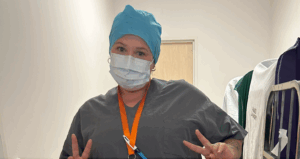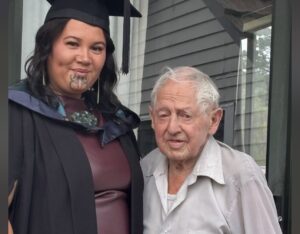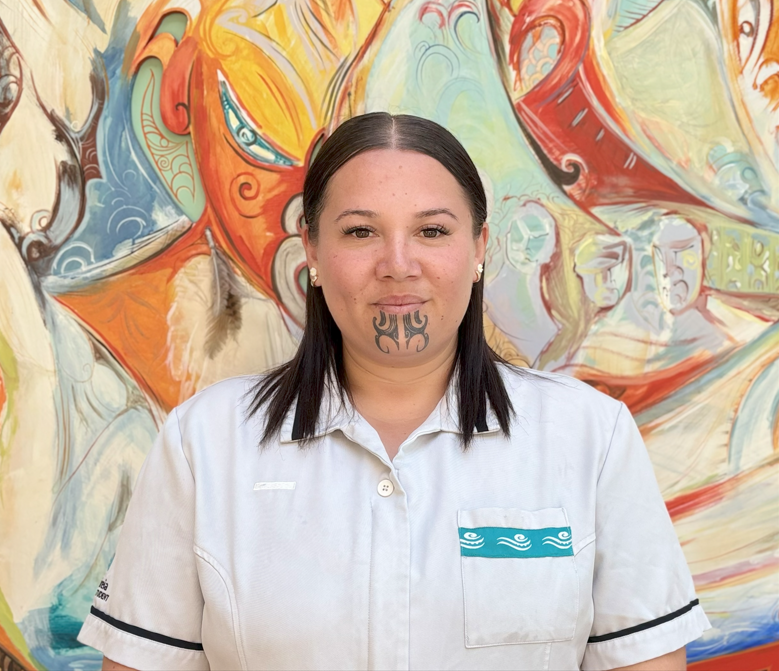The sole mother of two children graduated with a bachelor of nursing (Māori) from Whitireia and WelTec Institute of Technology last year, only to end up without a job as a nurse and finding it difficult to get a job outside health.
“I ticked all the boxes — got my degree, got registration, paid for the annual practising certificate. I’ve looked everywhere in the Wellington region for work but nothing,” said Tiatia who lives in Wainuiomata, Hutt Valley and hails from Ngāpuhi.
Last week Kaitiaki reported that less than half — just 45 per cent — of registered nursing (RN) graduates have been matched to supported-entry roles at Te Whatu Ora after mid-year finals.
Last month she registered with NETP-ACE (new entry to practice-advanced choice of employment) which is a programme run by Te Whatu Ora that is supposed to help match graduates to jobs in the nursing sector.
‘There are lots of jobs, heaps of jobs’
“At the NETP interview, which lasted 90 minutes, I told the coordinator about my concerns that there appeared to be very few nursing jobs in the Hutt Valley or even the Wellington region across my four preference areas.
“But she told me not to worry, that there’s lots of jobs, heaps of jobs. She also told me there were jobs overseas, which I frowned at.”
A few weeks after the interview, Tiatia got an email from NETP stating there were no jobs for her across any of the four areas she had identified: primary health, district nursing, community health and surgical.
“That email broke my heart. And now I know why they mentioned in the interview that there were jobs overseas.”

‘Hell no! Aotearoa is my home’
“I am Māori, tangata whenua in this land — Aotearoa. I want to help nurse my people, the sickest of all peoples in this country. It’s not fair that I should have to go overseas or even outside the Hutt Valley or Wellington region.
“There are plenty of sick people in this region. Too many sick people actually.”
The impact of moving overseas would mean that Tiatia would have to disconnect her children from their native language and their ancestral land.
“My children go to a full immersion Māori medium school and they don’t have those schools overseas. I just bought this house we are in right now.
“My children and I for the first time in our lives have a stable home. So moving across the ditch is not an option for us — I would traumatise my whānau by doing that.”
After receiving the email from Te Whatu Ora, Tiatia has been trying to find work in sectors outside health.
“I can’t even get a job as a receptionist, because I am an RN who is ‘overqualified’ – that’s what employers are telling me.”

Tiatia’s nursing teacher, Mereruia Rikihana, said it was “devastating” to hear graduates were not getting the jobs they studied so hard for.
“We check in on our students even after they’ve left us and we are hearing a few stories like Shayna. It’s devastating for us because we know there’s a need for not just nurses but culturally-and-clinically-competent Māori nurses. And our students tick both boxes.”

Tiatia has been put back in Te Whatu Ora’s talent pool of nursing graduates looking for work. She is expecting an email that would recommend she move away from the Wellington region in order to get work as a nurse.
“It doesn’t make sense for me to move, when I know so many nurses and doctors working in hospitals and clinics in this region who are saying there’s a major nursing shortage in their workplaces.
“My other concern about that talent pool, is that graduates from two years ago are still in there — waiting. And there’s about to be another wave of graduates from this year to be added to it.”
Low turnover in hospitals
When contacted for comment, Te Whatu Ora national chief nurse Nadine Gray said the agency “does not discuss overseas employment opportunities with graduates”.
Gray said it was anticipated that job opportunities would become available “in the weeks and months ahead” in hospitals and communities.
“In recent years, the majority of initially unmatched applicants have successfully secured positions from the talent pool.”
Gray said the number of ACE applicants who eventually found roles was running at about 85 per cent for 2023 and 2024.
Meanwhile, she said the nursing turnover rate in hospitals was lower than it had been for several years, “which tells us nurses are not leaving their jobs”.
“As at March . . . the annual turnover rate was 8.1 per cent, down from 14.4 per cent in 2022. Our nursing vacancy rate is also the lowest it has been for several years. It was 11.4 per cent in March 2021, compared to 3.6 per cent in March this year.”
However, Tiatia said that news was of no help to her.
“My preferences were very wide, not restricted to hospitals.”
Tiatia said one of the most heartbreaking impacts was having to tell her 90-year-old koro [grandfather], that she has not been able to get work as a nurse.

Even her koro is waiting
“My koro was too ill to come to my graduation, so before the ceremony I went to see him. He was so proud of me and told me: ‘When you get a job as a nurse, then I would be happy to leave this world, join our family up there.’
“Koro is still waiting, like me, and yes I feel so guilty about that.”
In the meantime, while she waits and turns the Hutt Valley upside down looking for a job, Tiatia is committed to her community.
“I have a few things to keep me busy. I coach the year five Wainuiomata kōtiro rugby team which my daughter is in.
“I teach them to run and tackle, and they are teaching me to be strong, and not to give up.”
Kaitiaki approached the office of the Health Minister Simeon Brown for comment but did not get a response by deadline.




